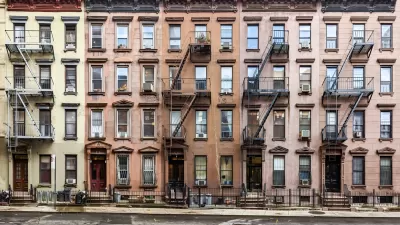The new study, published by the Urban Politics and Governance research group at McGill University, comes with a major disclaimer: it was funded by the Hotel Trades Council, AFL-CIO, among other.

Sally Goldenberg reports on a new report titled "The High Cost of Short-Term Rentals in New York City," which finds that Airbnb "exacerbates income inequality, benefits white hosts who own homes in predominantly black and Hispanic neighborhoods, and renders thousands of apartments unavailable in a city starved for housing."
More specifically, the study "concludes that Airbnb hosts are responsible for removing between 7,000 and 13,500 apartments from the city's long-term rental market, driving up rents by contributing to a housing shortage and threatening to gentrify neighborhoods that have historically been affordable to non-white residents."
A team from McGill University's School of Urban Planning performed all the analysis and crafted all the findings and conclusions of the report, with funding from the Hotel Trades Council, AFL-CIO, as well as New York-based housing and tenant advocacy organizations like New York Communities For Change, Housing Conservation Coordinators, Goddard Riverside Law Project, St. Nick’s Alliance, Cooper Square Committee, Mobilization for Justice (formerly MFY Legal Services), West Side Neighborhood Association, and the Hell’s Kitchen Neighborhood Association.
Inside Airbnb followed up on the news of the new study, placing it in a chronology it launched a year ago, when it published a study titled "Faces of Airbnb: NYC, Airbnb as a Racial Gentrification Tool." Murray Cox of Inside Airbnb writes that post, offering an explanation of that study's findings and a chronology of the ongoing controversy and debate over the effects of Airbnb.
The McGill University study isn't the only news worthy development in scientific study into the effects of short-term rental companies, though the following crop of news originates from the West Coast as a result of regulatory changes. As we reported earlier this month, the city of San Francisco's short-term rental market has been completely upended after new regulations took effect in recent months. A new study by the Bay Area Council Economic Institute [pdf] explains the recent policy changes and examines their impacts.
FULL STORY: Airbnb promotes income disparity, curbs rental market, union-backed study finds

Alabama: Trump Terminates Settlements for Black Communities Harmed By Raw Sewage
Trump deemed the landmark civil rights agreement “illegal DEI and environmental justice policy.”

Study: Maui’s Plan to Convert Vacation Rentals to Long-Term Housing Could Cause Nearly $1 Billion Economic Loss
The plan would reduce visitor accommodation by 25% resulting in 1,900 jobs lost.

Planetizen Federal Action Tracker
A weekly monitor of how Trump’s orders and actions are impacting planners and planning in America.

Waymo Gets Permission to Map SF’s Market Street
If allowed to operate on the traffic-restricted street, Waymo’s autonomous taxis would have a leg up over ride-hailing competitors — and counter the city’s efforts to grow bike and pedestrian on the thoroughfare.

Parklet Symposium Highlights the Success of Shared Spaces
Parklets got a boost during the Covid-19 pandemic, when the concept was translated to outdoor dining programs that offered restaurants a lifeline during the shutdown.

Federal Homelessness Agency Places Entire Staff on Leave
The U.S. Interagency Council on Homelessness is the only federal agency dedicated to preventing and ending homelessness.
Urban Design for Planners 1: Software Tools
This six-course series explores essential urban design concepts using open source software and equips planners with the tools they need to participate fully in the urban design process.
Planning for Universal Design
Learn the tools for implementing Universal Design in planning regulations.
Caltrans
Smith Gee Studio
Institute for Housing and Urban Development Studies (IHS)
City of Grandview
Harvard GSD Executive Education
Toledo-Lucas County Plan Commissions
Salt Lake City
NYU Wagner Graduate School of Public Service





























